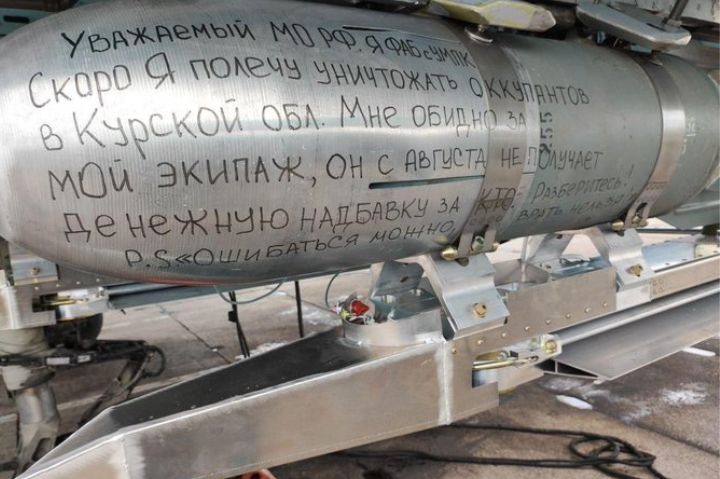In a rare act of defiance, Russian military personnel have taken to protesting their own leadership by inscribing a plea for unpaid bonuses directly onto a 250kg glide bomb. Typically reserved for messages targeting enemies, this unique protest inscription instead aims at Russia’s Ministry of Defense, highlighting mounting frustrations among soldiers over withheld payments. The bomb, equipped with a UMPK satellite guidance system, was photographed with the inscription, “Dear Minister of Defense, Please Pay Our Bonuses,” a message that was subsequently shared on social media.
Historically, inscriptions on bombs have carried battle cries or dedications to honor fallen comrades. But this unusual protest, directed inward, signals growing discontent within the ranks over administrative issues and unfulfilled promises, reflecting the morale challenges faced by Russian forces. The sarcastic plea comes amid reports of delayed wages and bonuses, an issue that has reportedly affected Russian military personnel across various theaters.
Shared by a pro-Ukrainian account on social media, the image underscores the hardships endured by Russian troops as the war drags on, straining both resources and morale. This unprecedented display of frustration highlights the internal strains within Russia’s military apparatus, turning what would typically be a weapon of warfare into a stark reminder of the struggles soldiers face off the battlefield.
1/ The use of a Russian bomb to send a protest to the Russian Ministry of Defence over non-payment of bonus pay has set off a furore in the Russian Air Force, with an entire unit reportedly stood down and undergoing an "epic fucking for about 8 hours". ⬇️https://t.co/SOvqghoSss
— ChrisO_wiki (@ChrisO_wiki) October 25, 2024
As the image circulates widely, it raises questions about how these frustrations may impact Russia’s military effectiveness and whether such visible discontent will prompt action from defense officials. In an army where unity and discipline are paramount, will this bold message resonate with Russia’s top brass, or is it a sign of deeper fissures yet to be addressed?












